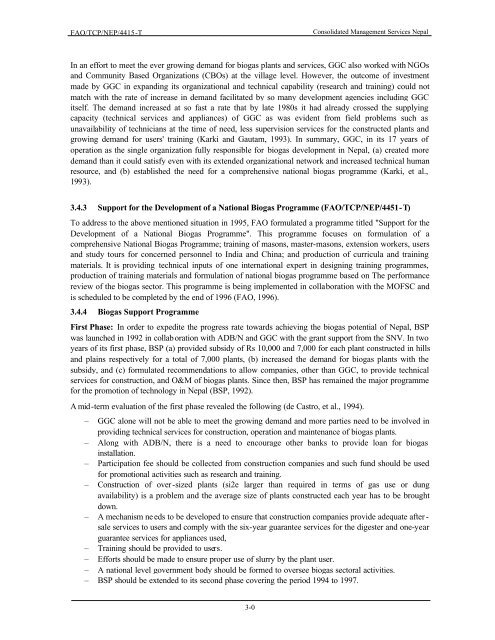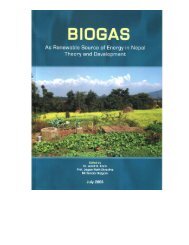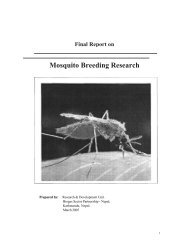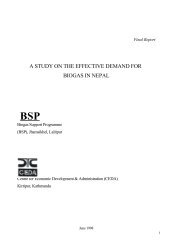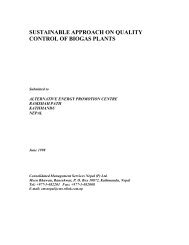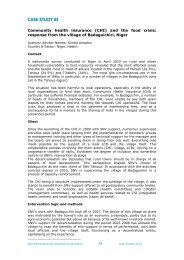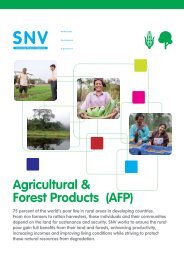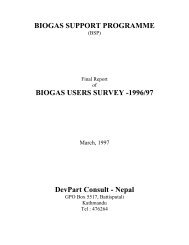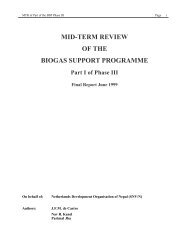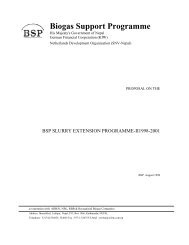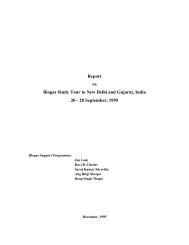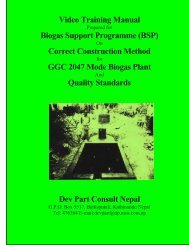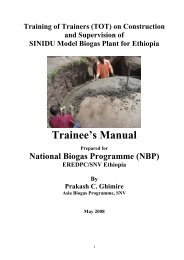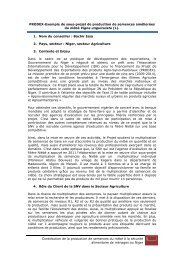download (pdf, 3MB) - SNV
download (pdf, 3MB) - SNV
download (pdf, 3MB) - SNV
Create successful ePaper yourself
Turn your PDF publications into a flip-book with our unique Google optimized e-Paper software.
FAO/TCP/NEP/4415-T<br />
Consolidated Management Services Nepal<br />
In an effort to meet the ever growing demand for biogas plants and services, GGC also worked with NGOs<br />
and Community Based Organizations (CBOs) at the village level. However, the outcome of investment<br />
made by GGC in expanding its organizational and technical capability (research and training) could not<br />
match with the rate of increase in demand facilitated by so many development agencies including GGC<br />
itself. The demand increased at so fast a rate that by late 1980s it had already crossed the supplying<br />
capacity (technical services and appliances) of GGC as was evident from field problems such as<br />
unavailability of technicians at the time of need, less supervision services for the constructed plants and<br />
growing demand for users' training (Karki and Gautam, 1993). In summary, GGC, in its 17 years of<br />
operation as the single organization fully responsible for biogas development in Nepal, (a) created more<br />
demand than it could satisfy even with its extended organizational network and increased technical human<br />
resource, and (b) established the need for a comprehensive national biogas programme (Karki, et al.,<br />
1993).<br />
3.4.3 Support for the Development of a National Biogas Programme (FAO/TCP/NEP/4451-T)<br />
To address to the above mentioned situation in 1995, FAO formulated a programme titled "Support for the<br />
Development of a National Biogas Programme". This programme focuses on formulation of a<br />
comprehensive National Biogas Programme; training of masons, master-masons, extension workers, users<br />
and study tours for concerned personnel to India and China; and production of curricula and training<br />
materials. It is providing technical inputs of one international expert in designing training programmes,<br />
production of training materials and formulation of national biogas programme based on The performance<br />
review of the biogas sector. This programme is being implemented in collaboration with the MOFSC and<br />
is scheduled to be completed by the end of 1996 (FAO, 1996).<br />
3.4.4 Biogas Support Programme<br />
First Phase: In order to expedite the progress rate towards achieving the biogas potential of Nepal, BSP<br />
was launched in 1992 in collab oration with ADB/N and GGC with the grant support from the <strong>SNV</strong>. In two<br />
years of its first phase, BSP (a) provided subsidy of Rs 10,000 and 7,000 for each plant constructed in hills<br />
and plains respectively for a total of 7,000 plants, (b) increased the demand for biogas plants with the<br />
subsidy, and (c) formulated recommendations to allow companies, other than GGC, to provide technical<br />
services for construction, and O&M of biogas plants. Since then, BSP has remained the major programme<br />
for the promotion of technology in Nepal (BSP, 1992).<br />
A mid-term evaluation of the first phase revealed the following (de Castro, et al., 1994).<br />
– GGC alone will not be able to meet the growing demand and more parties need to be involved in<br />
providing technical services for construction, operation and maintenance of biogas plants.<br />
– Along with ADB/N, there is a need to encourage other banks to provide loan for biogas<br />
installation.<br />
– Participation fee should be collected from construction companies and such fund should be used<br />
for promotional activities such as research and training.<br />
– Construction of over -sized plants (si2e larger than required in terms of gas use or dung<br />
availability) is a problem and the average size of plants constructed each year has to be brought<br />
down.<br />
– A mechanism ne eds to be developed to ensure that construction companies provide adequate after -<br />
sale services to users and comply with the six-year guarantee services for the digester and one-year<br />
guarantee services for appliances used,<br />
– Training should be provided to users.<br />
– Efforts should be made to ensure proper use of slurry by the plant user.<br />
– A national level government body should be formed to oversee biogas sectoral activities.<br />
– BSP should be extended to its second phase covering the period 1994 to 1997.<br />
3-0


